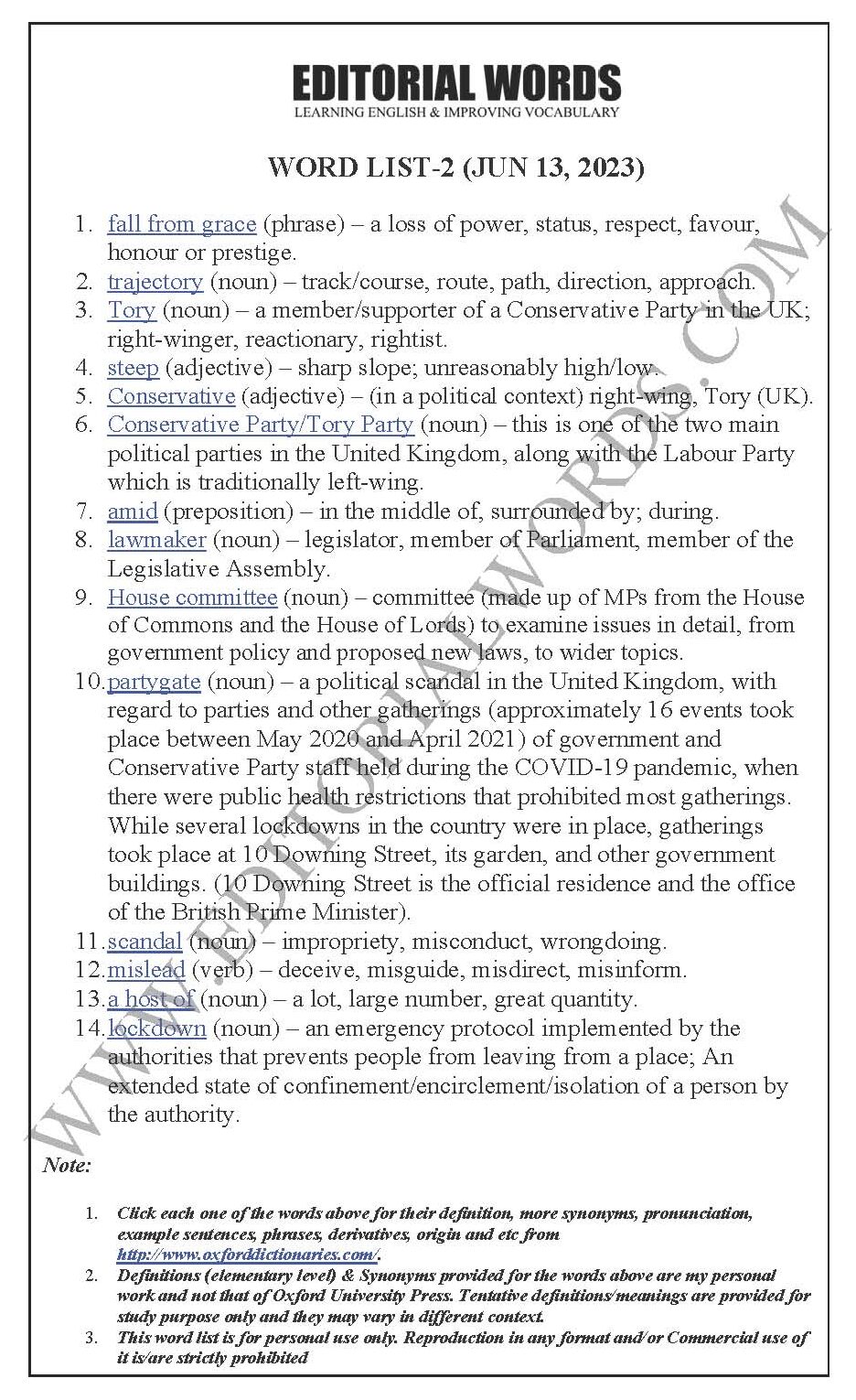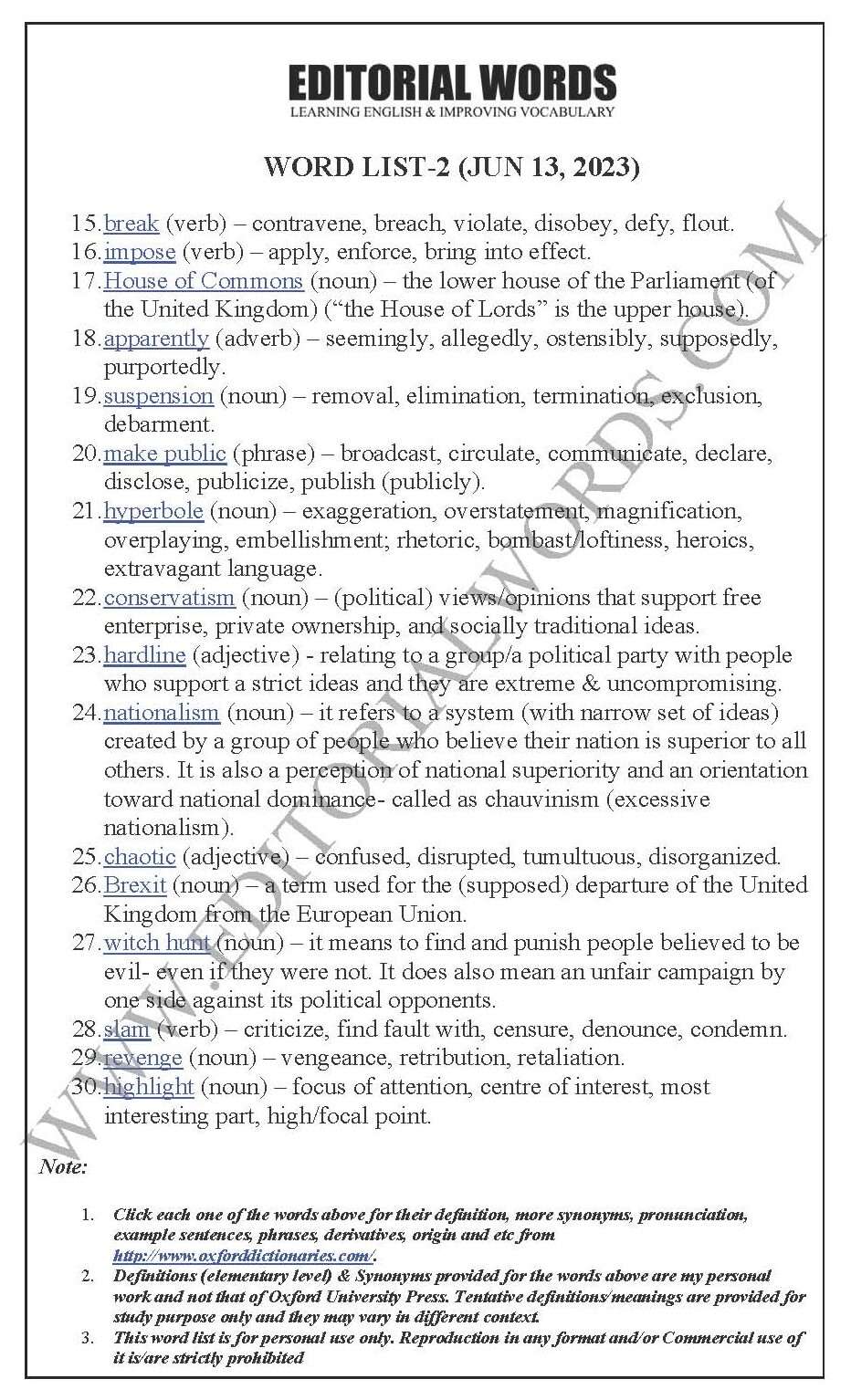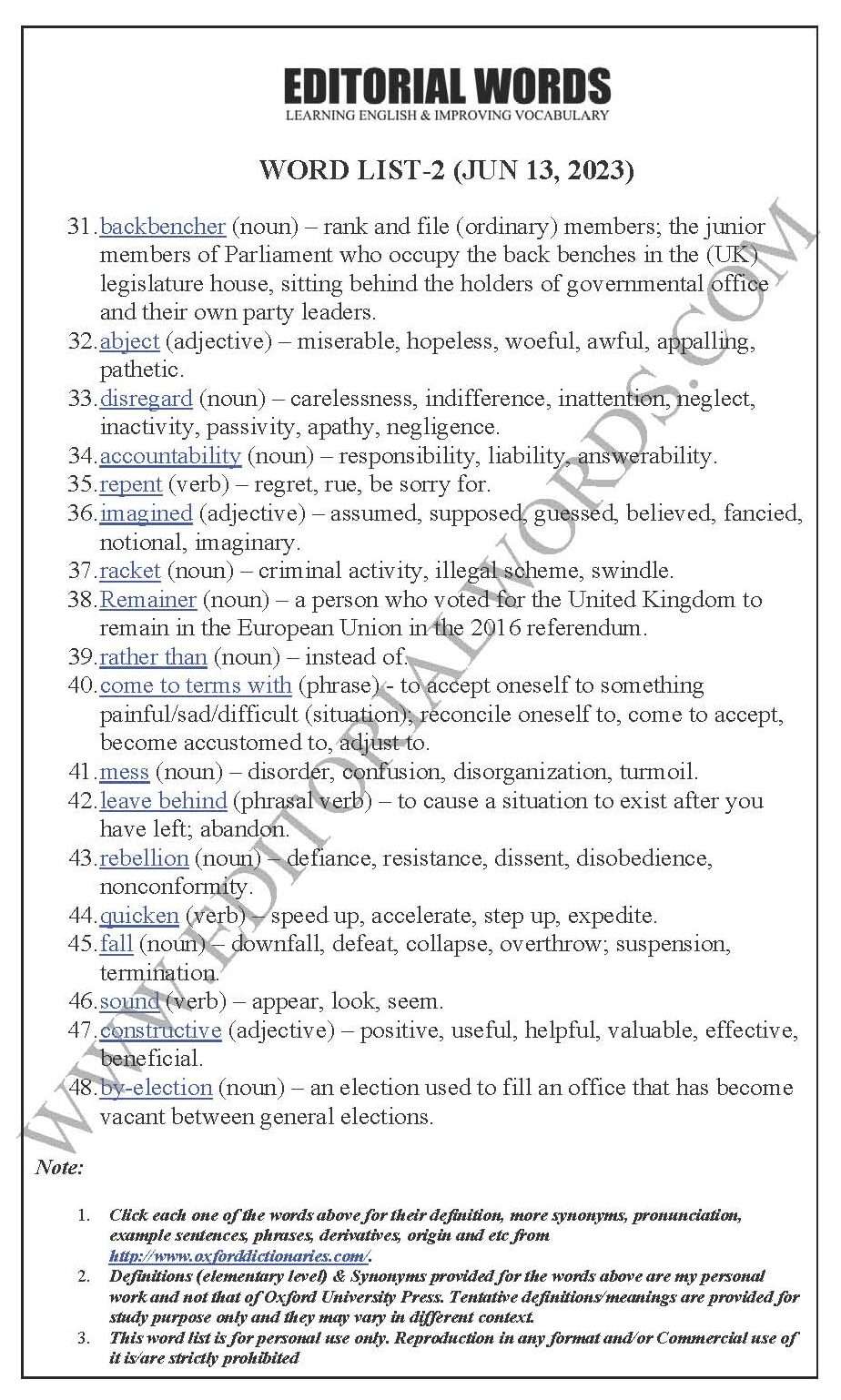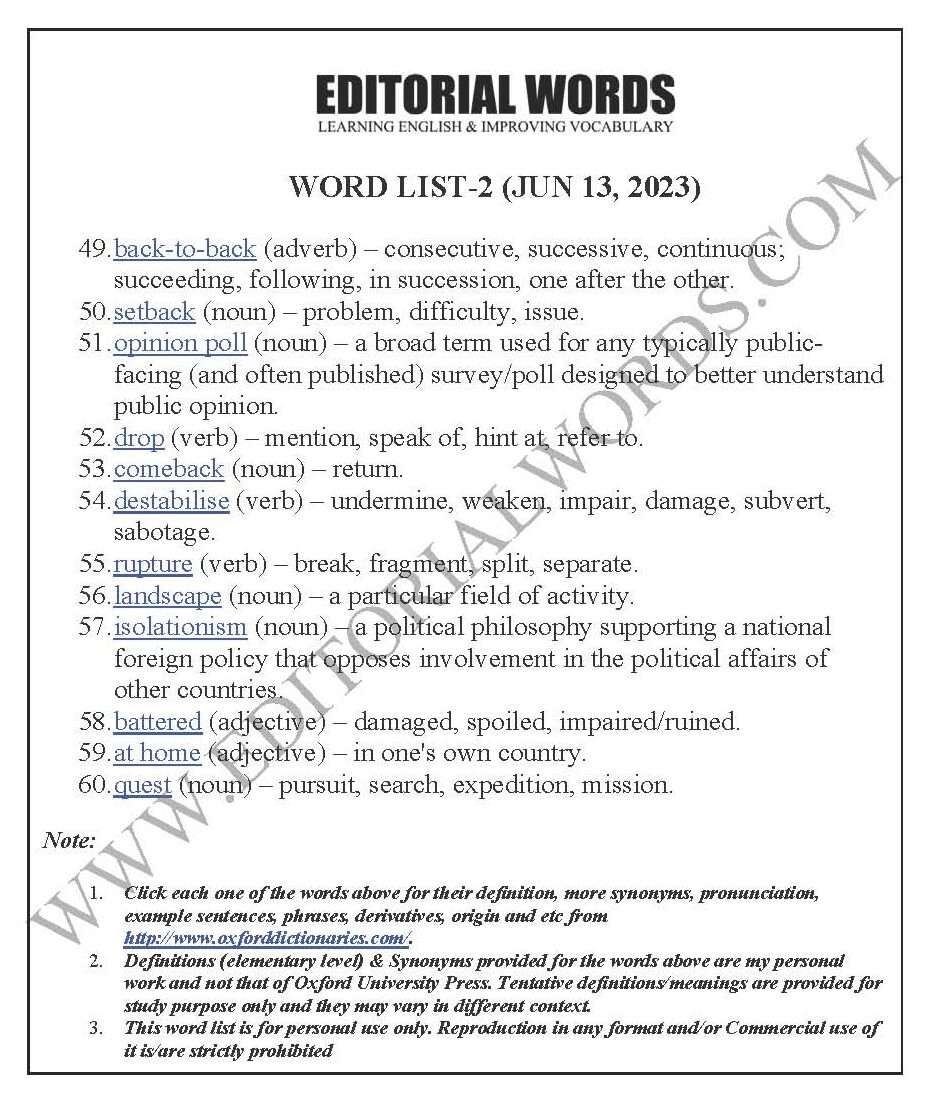The Hindu Editorial (Fall from grace) – June 13, 2023
To read this article, click “The Hindu”.
This preview is provided here with permission.
Courtesy: The Hindu
The Hindu Editorial (Fall from grace) – June 13, 2023:
- fall from grace (phrase) – a loss of power, status, respect, favour, honour or prestige.
- trajectory (noun) – track/course, route, path, direction, approach.
- Tory (noun) – a member/supporter of a Conservative Party in the UK; right-winger, reactionary, rightist.
- steep (adjective) – sharp slope; unreasonably high/low.
- Conservative (adjective) – (in a political context) right-wing, Tory (UK).
- Conservative Party/Tory Party (noun) – this is one of the two main political parties in the United Kingdom, along with the Labour Party which is traditionally left-wing.
- amid (preposition) – in the middle of, surrounded by; during.
- lawmaker (noun) – legislator, member of Parliament, member of the Legislative Assembly.
- House committee (noun) – committee (made up of MPs from the House of Commons and the House of Lords) to examine issues in detail, from government policy and proposed new laws, to wider topics.
- partygate (noun) – a political scandal in the United Kingdom, with regard to parties and other gatherings (approximately 16 events took place between May 2020 and April 2021) of government and Conservative Party staff held during the COVID-19 pandemic, when there were public health restrictions that prohibited most gatherings. While several lockdowns in the country were in place, gatherings took place at 10 Downing Street, its garden, and other government buildings. (10 Downing Street is the official residence and the office of the British Prime Minister).
- scandal (noun) – impropriety, misconduct, wrongdoing.
- mislead (verb) – deceive, misguide, misdirect, misinform.
- a host of (noun) – a lot, large number, great quantity.
- lockdown (noun) – an emergency protocol implemented by the authorities that prevents people from leaving from a place; An extended state of confinement/encirclement/isolation of a person by the authority.
- break (verb) – contravene, breach, violate, disobey, defy, flout.
- impose (verb) – apply, enforce, bring into effect.
- House of Commons (noun) – the lower house of the Parliament (of the United Kingdom) (“the House of Lords” is the upper house).
- apparently (adverb) – seemingly, allegedly, ostensibly, supposedly, purportedly.
- suspension (noun) – removal, elimination, termination, exclusion, debarment.
- make public (phrase) – broadcast, circulate, communicate, declare, disclose, publicize, publish (publicly).
- hyperbole (noun) – exaggeration, overstatement, magnification, overplaying, embellishment; rhetoric, bombast/loftiness, heroics, extravagant language.
- conservatism (noun) – (political) views/opinions that support free enterprise, private ownership, and socially traditional ideas.
- hardline (adjective) – relating to a group/a political party with people who support a strict ideas and they are extreme & uncompromising.
- nationalism (noun) – it refers to a system (with narrow set of ideas) created by a group of people who believe their nation is superior to all others. It is also a perception of national superiority and an orientation toward national dominance- called as chauvinism (excessive nationalism).
- chaotic (adjective) – confused, disrupted, tumultuous, disorganized.
- Brexit (noun) – a term used for the (supposed) departure of the United Kingdom from the European Union.
- witch hunt (noun) – it means to find and punish people believed to be evil- even if they were not. It does also mean an unfair campaign by one side against its political opponents.
- slam (verb) – criticize, find fault with, censure, denounce, condemn.
- revenge (noun) – vengeance, retribution, retaliation.
- highlight (noun) – focus of attention, centre of interest, most interesting part, high/focal point.
- backbencher (noun) – rank and file (ordinary) members; the junior members of Parliament who occupy the back benches in the (UK) legislature house, sitting behind the holders of governmental office and their own party leaders.
- abject (adjective) – miserable, hopeless, woeful, awful, appalling, pathetic.
- disregard (noun) – carelessness, indifference, inattention, neglect, inactivity, passivity, apathy, negligence.
- accountability (noun) – responsibility, liability, answerability.
- repent (verb) – regret, rue, be sorry for.
- imagined (adjective) – assumed, supposed, guessed, believed, fancied, notional, imaginary.
- racket (noun) – criminal activity, illegal scheme, swindle.
- Remainer (noun) – a person who voted for the United Kingdom to remain in the European Union in the 2016 referendum.
- rather than (noun) – instead of.
- come to terms with (phrase) – to accept oneself to something painful/sad/difficult (situation); reconcile oneself to, come to accept, become accustomed to, adjust to.
- mess (noun) – disorder, confusion, disorganization, turmoil.
- leave behind (phrasal verb) – to cause a situation to exist after you have left; abandon.
- rebellion (noun) – defiance, resistance, dissent, disobedience, nonconformity.
- quicken (verb) – speed up, accelerate, step up, expedite.
- fall (noun) – downfall, defeat, collapse, overthrow; suspension, termination.
- sound (verb) – appear, look, seem.
- constructive (adjective) – positive, useful, helpful, valuable, effective, beneficial.
- by-election (noun) – an election used to fill an office that has become vacant between general elections.
- back-to-back (adverb) – consecutive, successive, continuous; succeeding, following, in succession, one after the other.
- setback (noun) – problem, difficulty, issue.
- opinion poll (noun) – a broad term used for any typically public-facing (and often published) survey/poll designed to better understand public opinion.
- drop (verb) – mention, speak of, hint at, refer to.
- comeback (noun) – return.
- destabilise (verb) – undermine, weaken, impair, damage, subvert, sabotage.
- rupture (verb) – break, fragment, split, separate.
- landscape (noun) – a particular field of activity.
- isolationism (noun) – a political philosophy supporting a national foreign policy that opposes involvement in the political affairs of other countries.
- battered (adjective) – damaged, spoiled, impaired/ruined.
- at home (adjective) – in one’s own country.
- quest (noun) – pursuit, search, expedition, mission.
Note:
1. Click each one of the words above for their definition, more synonyms, pronunciation, example sentences, phrases, derivatives, origin and etc from http://www.oxforddictionaries.com/.
2. Definitions (elementary level) & Synonyms provided for the words above are my personal work and not that of Oxford University Press. Tentative definitions/meanings are provided for study purpose only and they may vary in a different context.
3. This word list is for personal use only. Reproduction in any format and/or Commercial use of it is/are strictly prohibited.
The Hindu Editorial (Fall from grace) – June 13, 2023:




“Phrasal Verbs” We Learnt Last Week
“Idioms & Phrases” We Learnt Last Week
“Important Definitions” We Learnt Last Week
Recent Word Lists For The Hindu Editorial Articles

Four years ago, Boris Johnson won an election for the Tories with an 80-seat majority, their biggest victory since 1987… For further reading, visit “The Hindu“. Below is today’s word list-2 for The Hindu Editorial (Fall from grace) – June 13, 2023.